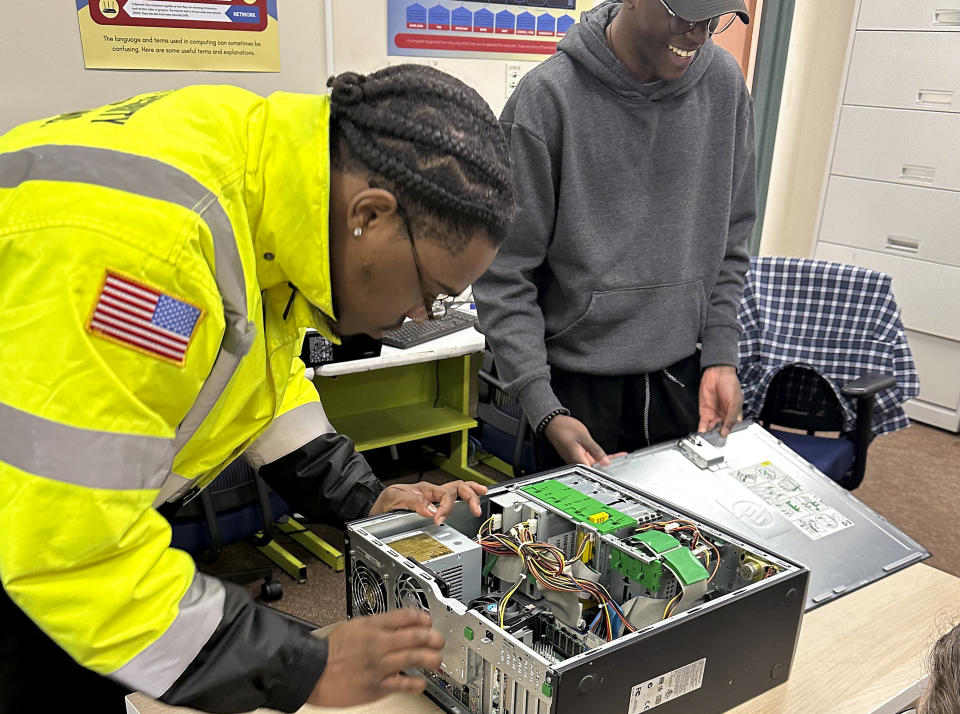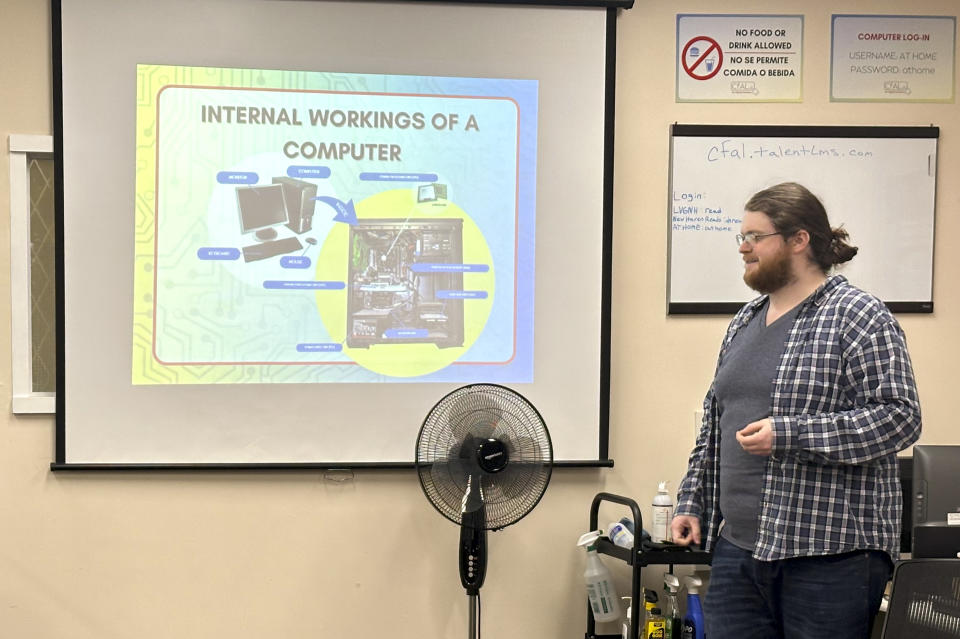HARTFORD, Conn. (AP) — With many jobs expected to eventually rely on generative artificial intelligence, states are trying to help workers bolster their tech skills before they become outdated and are tricked by machines that are becoming increasingly intelligent. .
Connecticut is working to create what proponents believe will be the nation’s first Citizens AI Academy, a free online repository of curated classes that users can take to learn basic skills or earn a certificate needed for employment.
“This is a rapidly evolving area,” said Democratic state Sen. James Maroney. “So we all need to learn what the best sources are to stay up to date. How can we update our skills? Who can be reliable sources?”
Determining what skills are needed in an AI world can be challenging for state policymakers, given the fast-moving nature of the technology and differing opinions on the best approach.
Gregory LaBlanc, professor of Finance, Strategy and Law at the Haas School of Business at Berkeley Law School in California, says workers should be taught how to use and manage generative AI rather than how the technology works, in part because computers will soon be more capable. to perform certain tasks previously performed by humans.
“What we need is to lean on things that complement AI, rather than learning to be poor imitators of AI,” he said. “We need to figure out what AI is not good at and then teach those things. usually things like creativity, empathy, high-level problem solving.”
He said historically people don’t need to understand technological advances to be successful.
“When electricity came along, we didn’t tell everyone they needed to become an electrical engineer,” LeBlanc said.
This year, at least four states – Connecticut, California, Mississippi and Maryland – proposed legislation that attempted to somehow address AI in the classroom. They ranged from Connecticut’s planned AI Academy, which was originally included in a broad AI regulation bill that failed but the concept is still being developed by state education officials, to proposed working groups examining how A.I. can be safely incorporated into public schools. One bill died in the Mississippi legislature, while the others remain in flux.

A bill in California would require a state working group to consider incorporating AI literacy skills into math, science, history and social science curricula.
“AI has the potential to positively impact the way we live, but only if we know how to use it and use it responsibly,” said the bill’s author, Assemblymember Marc Berman, in a statement. “Regardless of their future profession, we must ensure that all students understand the basic principles and applications of AI, have the skills to recognize when AI is used, and are aware of the implications, limitations and ethical considerations of AI.”
The project is supported by the California Chamber of Commerce. CalChamber Policy Advocate Ronak Daylami said in a statement that incorporating the information into existing school curricula will “dispel the stigma and mystique of the technology, not only helping students become more thoughtful and intentional users and consumers of AI.” , but also better positioning future generations of workers to succeed in an AI-driven workforce and, hopefully, inspiring the next generation of computer scientists.”
While Connecticut’s planned AI Academy is expected to offer certificates for people who complete certain skills programs that may be needed for careers, Maroney said the academy will also include the basics, from digital literacy to how to ask a chatbot questions.
He said it’s important for people to have the skills to understand, evaluate and effectively interact with AI technologies, whether it’s a chatbot or machines that learn to identify problems and make decisions that mimic human decision-making.
“Most jobs will require some form of literacy,” Maroney said. “I think if you don’t learn how to use it, you’re at a disadvantage.”
A September 2023 study released by job search firm Even found that all U.S. jobs listed on the platform had skills that could be performed or augmented by generative AI. Nearly 20% of jobs were considered “highly exposed,” meaning the technology is considered good or excellent in 80% or more of the skills mentioned in Indeed’s job listings.
Nearly 46% of jobs on the platform were “moderately exposed,” meaning GenAI can perform 50% to 80% of skills.
Maroney said he is concerned about how this skills gap — coupled with a lack of access to high-speed Internet, computers and smartphones in some disadvantaged communities — will exacerbate the problem of inequality.
A report released in February of McKinsey and Company, a global management consulting firm, projected that generative AI could increase US household wealth by nearly $500 billion by 2045, but would also widen the wealth gap between black and white households by 43 billion dollars annually.
Advocates have worked for years to close the country’s digital skills gap, often focusing on the basics of computer literacy and improving access to the Internet and reliable devices, especially for people living in urban and rural areas. The advent of AI brings additional challenges to this task, said Marvin Venay, director of external affairs and director of advocacy at the Massachusetts-based organization Bring Tech Home.


“Education must be included for this to really take off publicly… in a way that gives people the ability to eliminate their barriers,” he said of AI. “And it has to be able to explain to the average person why it’s not just a useful tool, but why that tool is going to be something that’s trustworthy.”
Tesha Tramontano-Kelly, executive director of the Connecticut-based group CfAL for Digital Inclusion, said she fears lawmakers are “putting the cart before the horse” when it comes to talking about AI training. Ninety percent of young people and adults who attend your organization’s free digital literacy classes do not have a computer at home.
Although Connecticut is considered technologically advanced compared to many other states and almost every family can get Internet service, a recent state digital heritage study only around three-quarters subscribe to broadband. A survey conducted as part of the study found that 47% of respondents find it somewhat or very difficult to pay for Internet service.
Of residents who reported household incomes at or below 150% of the federal poverty level, 32% do not own a computer and 13% do not own any Internet-enabled devices.
Tramontano-Kelly said ensuring the internet is accessible and technological equipment is accessible are important first steps.
“So teaching people about AI is very important. I agree with that 100%,” she said. “But the conversation also needs to be about everything else that comes with AI.”

































